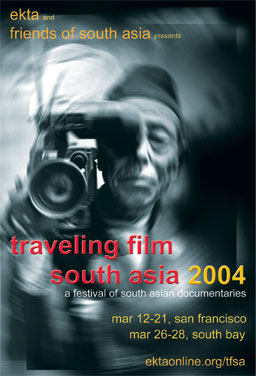 SHARED
HISTORY AND DIVERSE CULTURES SHARED
HISTORY AND DIVERSE CULTURES
FIND VOICE AT TRAVELING FILM
SOUTH ASIA 2004
Showcasing the groundbreaking work and emerging talent of non-fiction
filmmakers from South Asia, Traveling Film South Asia 2004 debuts
on March 12 as the only festival of its kind in California. Organized by Ekta and Friends
of South Asia (FOSA), in collaboration with Himal Association, the festival
offers Bay Area filmgoers a rare opportunity to view a selection of 19 compelling
documentaries that chart the shared history and complex lives of the people
of the sub-continent. Covering a wide range of important political, social,
and economic issues and giving voice to many of the region’s people—women,
religious minorities, and indigenous communities—the films focus the
lens on life in contemporary South Asia, while celebrating its rich cultural
diversity. Representing filmmakers from Bangladesh, India, Nepal, and Pakistan,
this year’s festival is a compilation of award-winning and thought-provoking
films that include a selection of films from the 2003
Film South Asia (FSA) festival in Nepal, six films that screened at the
recently concluded World Social Forum in India, and two films by the internationally
acclaimed Pakistani filmmaker, Sabiha Sumar. The event runs from March 12-21
in San Francisco and from March 26-28 in Milpitas.
 As
the only such event solely dedicated to supporting contemporary South
Asian non-fiction films, TFSA 2004 provides a unique platform for filmmakers
to exhibit new works that examine critical and often provocative issues.
This year’s festival is particularly noteworthy because it screens
three films that were censored by the recent Mumbai International Film
Festival due to their anti-establishment content. The rejection of the
films spawned a massive protest in the documentary film community, with
over 170 Indian filmmakers threatening to boycott the festival [see Vikalp:
Films for Freedom website]. In a political climate that threatens
freedom of expression, festivals such as TFSA 2004 play an important
role in advocacy and social change. For this reason, Film South Asia—the
festival that TFSA draws upon—has gained a deserving recognition
in the international community as a world-class festival that gives voice
to visionary documentary filmmakers. Since its beginnings in 1997, Film
South Asia has traveled to more than 45 international venues. As
the only such event solely dedicated to supporting contemporary South
Asian non-fiction films, TFSA 2004 provides a unique platform for filmmakers
to exhibit new works that examine critical and often provocative issues.
This year’s festival is particularly noteworthy because it screens
three films that were censored by the recent Mumbai International Film
Festival due to their anti-establishment content. The rejection of the
films spawned a massive protest in the documentary film community, with
over 170 Indian filmmakers threatening to boycott the festival [see Vikalp:
Films for Freedom website]. In a political climate that threatens
freedom of expression, festivals such as TFSA 2004 play an important
role in advocacy and social change. For this reason, Film South Asia—the
festival that TFSA draws upon—has gained a deserving recognition
in the international community as a world-class festival that gives voice
to visionary documentary filmmakers. Since its beginnings in 1997, Film
South Asia has traveled to more than 45 international venues.
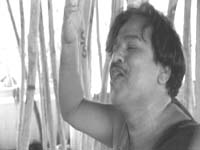 TFSA
2004 will be held over three weekends in March at two Bay Area venues:
at the Mission Cultural Center, San Francisco, during March 12-14 and
March 19-21, and at the India Community Center, Milpitas, during March
26-28. The March 12 program opens at the Mission Cultural Center at 7
p.m. with a screening of Amar Kanwar’s, A
NIGHT OF PROPHECY (India, 2002). One of the films censored at the
recent Mumbai International Film Festival but shown at the World Social
Forum, this poetic documentary travels through different parts of India
to reveal how poetry and music can unify a nation’s people even
in the face of severe conflict and oppression. The program continues
with the groundbreaking RESILIENT
RHYTHMS (India, 2002), a dynamic and truthful portrayal of India’s
caste system and the Dalit response to their marginalization. Gopal Menon,
known for his compelling and acclaimed documentary, Hey Ram: Genocide
in the Land of Gandhi, directed the film. TFSA
2004 will be held over three weekends in March at two Bay Area venues:
at the Mission Cultural Center, San Francisco, during March 12-14 and
March 19-21, and at the India Community Center, Milpitas, during March
26-28. The March 12 program opens at the Mission Cultural Center at 7
p.m. with a screening of Amar Kanwar’s, A
NIGHT OF PROPHECY (India, 2002). One of the films censored at the
recent Mumbai International Film Festival but shown at the World Social
Forum, this poetic documentary travels through different parts of India
to reveal how poetry and music can unify a nation’s people even
in the face of severe conflict and oppression. The program continues
with the groundbreaking RESILIENT
RHYTHMS (India, 2002), a dynamic and truthful portrayal of India’s
caste system and the Dalit response to their marginalization. Gopal Menon,
known for his compelling and acclaimed documentary, Hey Ram: Genocide
in the Land of Gandhi, directed the film.
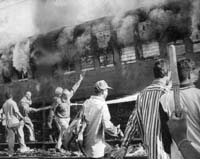 Reflecting
the current political situation in India, religious fundamentalism and
the need for tolerance was a powerful and recurrent theme explored by
many of the films. In GODHRA
TAK: THE TERROR TRAIL (India, 2003), director Shubradeep Chakravorty
investigates the Godhra train burning and subsequent rioting that killed
2000 Muslims in Gujarat, India in February 2002. Chakravorty retraces
in chilling detail the route of the first batch of kar sevaks from Gujarat
to Ayodhya and back and carefully reconstructs the terror they unleashed
en route leading to the Godhra fire and the riots that followed. In a
climate of increasing religious divides, directors Jayasankar and Monteiro
provide a glimmer of hope in their film, NAATA – THE
BOND (India, 2003). The film is a moving tale of two friends who
work on promoting communal harmony in Bombay’s largest slum. Naata
was one of the films removed from the Mumbai International Film Festival,
but shown at the World Social Forum in Mumbai in January 2004. Reflecting
the current political situation in India, religious fundamentalism and
the need for tolerance was a powerful and recurrent theme explored by
many of the films. In GODHRA
TAK: THE TERROR TRAIL (India, 2003), director Shubradeep Chakravorty
investigates the Godhra train burning and subsequent rioting that killed
2000 Muslims in Gujarat, India in February 2002. Chakravorty retraces
in chilling detail the route of the first batch of kar sevaks from Gujarat
to Ayodhya and back and carefully reconstructs the terror they unleashed
en route leading to the Godhra fire and the riots that followed. In a
climate of increasing religious divides, directors Jayasankar and Monteiro
provide a glimmer of hope in their film, NAATA – THE
BOND (India, 2003). The film is a moving tale of two friends who
work on promoting communal harmony in Bombay’s largest slum. Naata
was one of the films removed from the Mumbai International Film Festival,
but shown at the World Social Forum in Mumbai in January 2004.
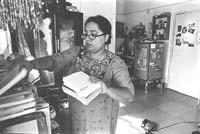 From
body image to struggling for personal freedom in a male-dominated society,
some of the most outstanding films of the festival focus on women’s
issues. SKIN DEEP (India,
1998), by Reena Mohan, is an exploration of body images and self-perception
among contemporary urban, middle class women in India. The film is a
playful, engrossing, and articulate rendering on women’s complicated
and contradictory relationships with their bodies. SWARA – A
BRIDGE OVER TROUBLED WATER (Pakistan, 2003), by Samar Minallah, is
a hard-hitting commentary on the Pakhtun practice of giving minor girls
in marriage to an “enemy family” in reparation for serious
crimes committed by male members of the girl’s family. The issue
is now before the Pakistan’s Supreme Court and Minallah is hoping
that legislation is brought soon to ban the practice of “swara.” Also
from Pakistan, is director Sabiha Sumar’s film, DON’T
ASK WHY (1999). Based on a diary, the film takes us into the life
of Anousheh and provides a moving account of the dreams and fears of
a 17-year-old girl growing up in a conservative and patriarchal society.
Most of Sumar’s films are banned in her native country. From
body image to struggling for personal freedom in a male-dominated society,
some of the most outstanding films of the festival focus on women’s
issues. SKIN DEEP (India,
1998), by Reena Mohan, is an exploration of body images and self-perception
among contemporary urban, middle class women in India. The film is a
playful, engrossing, and articulate rendering on women’s complicated
and contradictory relationships with their bodies. SWARA – A
BRIDGE OVER TROUBLED WATER (Pakistan, 2003), by Samar Minallah, is
a hard-hitting commentary on the Pakhtun practice of giving minor girls
in marriage to an “enemy family” in reparation for serious
crimes committed by male members of the girl’s family. The issue
is now before the Pakistan’s Supreme Court and Minallah is hoping
that legislation is brought soon to ban the practice of “swara.” Also
from Pakistan, is director Sabiha Sumar’s film, DON’T
ASK WHY (1999). Based on a diary, the film takes us into the life
of Anousheh and provides a moving account of the dreams and fears of
a 17-year-old girl growing up in a conservative and patriarchal society.
Most of Sumar’s films are banned in her native country.
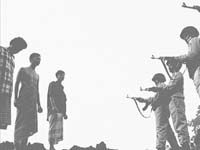 Two
films from Bangladesh reveal that the nation’s freedom struggle
of the 1970s continues to be an important theme for its filmmakers. In WORDS
OF FREEDOM (MUKTIR KOTHA) (1999), directors Tareque Masud and Catherine
Masud tell the story of musicians traveling through refugee camps and
war zones during the Liberation War in 1971. The film blends documentary
and fictional genres in a musical structure to follow the birth of a
nation and the ideals of secularism and tolerance on which it was founded.
In TALE OF THE DARKEST
NIGHT (SHEI RATER KOTHA BOLTE ESHECHI) (2001), director Kawsar Chowdhury
recreates the horror of the massacre by the Pakistani army in Dhaka University.
The film won the Second Best Film Award at Film South Asia 2003. Two
films from Bangladesh reveal that the nation’s freedom struggle
of the 1970s continues to be an important theme for its filmmakers. In WORDS
OF FREEDOM (MUKTIR KOTHA) (1999), directors Tareque Masud and Catherine
Masud tell the story of musicians traveling through refugee camps and
war zones during the Liberation War in 1971. The film blends documentary
and fictional genres in a musical structure to follow the birth of a
nation and the ideals of secularism and tolerance on which it was founded.
In TALE OF THE DARKEST
NIGHT (SHEI RATER KOTHA BOLTE ESHECHI) (2001), director Kawsar Chowdhury
recreates the horror of the massacre by the Pakistani army in Dhaka University.
The film won the Second Best Film Award at Film South Asia 2003.
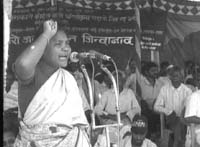 Other
important themes explored in the films include the harmful effects of
migration, displacement of rural and indigenous communities due to large
development projects, and environmental degradation. Other
important themes explored in the films include the harmful effects of
migration, displacement of rural and indigenous communities due to large
development projects, and environmental degradation.
Ekta and Friends of South Asia (FOSA) present the festival, in collaboration
with Himal Association. Ekta is a local nonprofit organization that provides
a platform for social change through art, dialogue, and education within
the South Asian community. FOSA is a Bay Area group that works towards
a peaceful, prosperous, and hate-free South Asia. Located in the Kathmandu
Valley region of Nepal, Himal Association is a nonprofit organization whose
goal is to raise awareness of local, national, and international issues
among
Nepali people. Festival co-sponsors include the Center for South Asian
Studies (University of California at Berkeley), the Department of Cultural
and Social
Anthropology at the California Institute for Integral Studies, the India
Community Center, and SF Station.
For a complete list of films and show times, further information, or
to purchase tickets online, visit http://ektaonline.org/tfsa or
email tfsa@ektaonline.org.
Tickets per show are $6 online ($9
at the door) at the Mission Cultural Center. For screenings at the India
Community Center, tickets are $5 (at the door or online).
A festival pass that covers films at both venues can be purchased online
for $25. |

